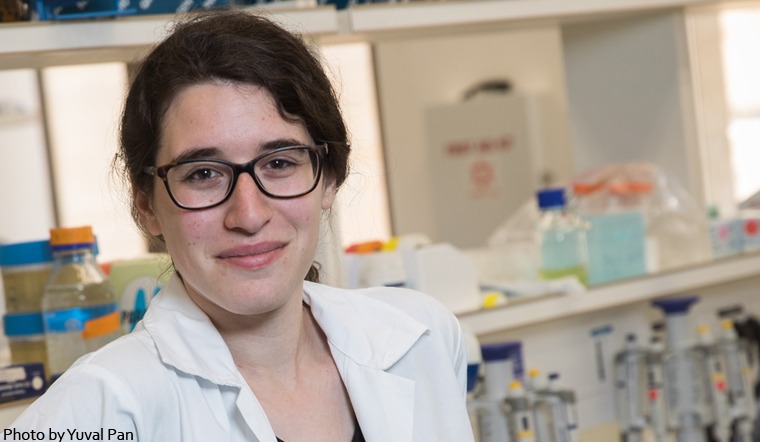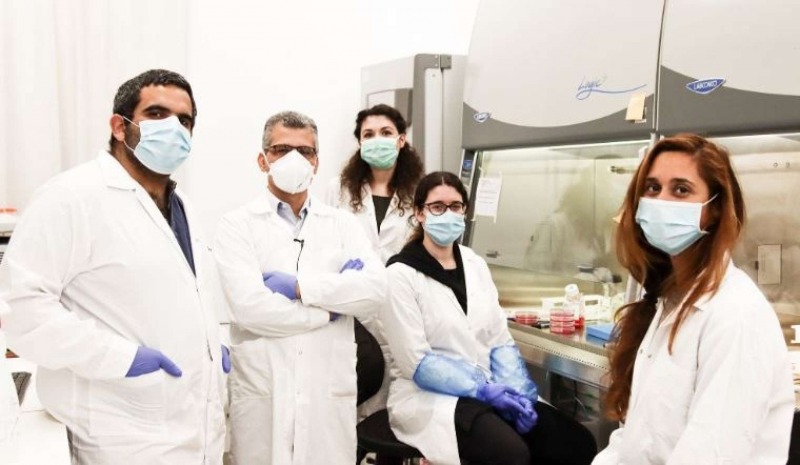
Chaja Katzman is a second-year student of Bio-Medical Sciences at the Hebrew University. She immigrated to Israel from the Netherlands three years ago, after volunteering in Jerusalem’s Shaare Zedek Medical Center for a year.
After making aliya, Chaja decided to study at the Hebrew University. She enrolled in the Rothberg International School’s preparatory program, a year-long academic program that helps new immigrants gain acceptance to the Hebrew University. The program includes three specialized tracks, and Chaja chose the science track.
Prior to this, Chaja had very little exposure to science. Growing up in a religious community, her high school’s curriculum included some science, yet she took only introductory classes. If Chaja gave science any thought at all, she imagined mixing substances and exploding bottles. Chaja successfully completed the program and was accepted to the Bio-Medical Sciences program. Doing so, she became one of the first in her extended family to attend University.
The program offers a summer scholarship to encourage first- and second-year students to gain hands-on research experiences. Chaja applied before her first year – and was accepted. She joined the lab of Dr. Lior Nissim, a synthetic biologist, and has been there ever since.
When the Coronavirus pandemic struck, Dr. Lior’s lab began working on three projects.
-
In collaboration with the Israel Institute for Biological Research (IIBR): Designed a method for infecting mice, in order to test potential vaccines and COVID-19 treatment modalities. Mice lack receptors (a protein) for SARS-2, and thus are naturally immune. Dr. Nissim’s lab developed a method to cause mice to express these receptors by infection them with an engineered virus, thus enabling subsequent SARS-2 mouse infection. Chaja helped design, clone, and produce this engineered virus, while infecting the mouse lung cells that were submitted to the IIBR for validation. If successful, this will be made available to laboratories worldwide, enabling them to conduct research and explore vaccines on animals, before beginning human trials.
-
Together with Prof. Amiram Goldblum’s lab, developing an integrated computational and synthetic biology platform for testing the effectiveness of anti-viral drugs against COVID-19 – without handling live samples of the SARS-2 virus in the lab (working with live samples requires strict bio-safety measures which are rarely available). This modular platform can potentially be adapted to screen drugs for virtually any virus type. Chaja helped design the synthetic gene circuits required and engineer the virus, and is preparing to conduct initial screenings with repurposed, FDA-approved drugs identified by Prof. Goldblum.
- Developing a 1-minute diagnosis for COVID-19, in collaboration with the Israeli Defense Forces (IDF) and several hospitals. This project was largely supported by Israel’s Ministry of Health.
Chaja has been working relentlessly on these projects, 10-16 hours a day in the lab, seven days a week. In fact, thanks to her tireless efforts, Dr. Nissim’s lab completed the first project in two and a half weeks rather than the requested month (which was already considered a very demanding deadline). In addition, Chaja received a congratulatory letter from Rector Barak Medina, along with a scholarship.
Chaja greatly enjoys working in Dr. Nissim’s lab, for its radically different approach. She says, “Most biologists study, understand, and manipulate existing genes. But synthetic biology often seems closer to engineering. I am fascinated by this field, it's like a puzzle.”

The team in Dr. Lior Nissim's lab


